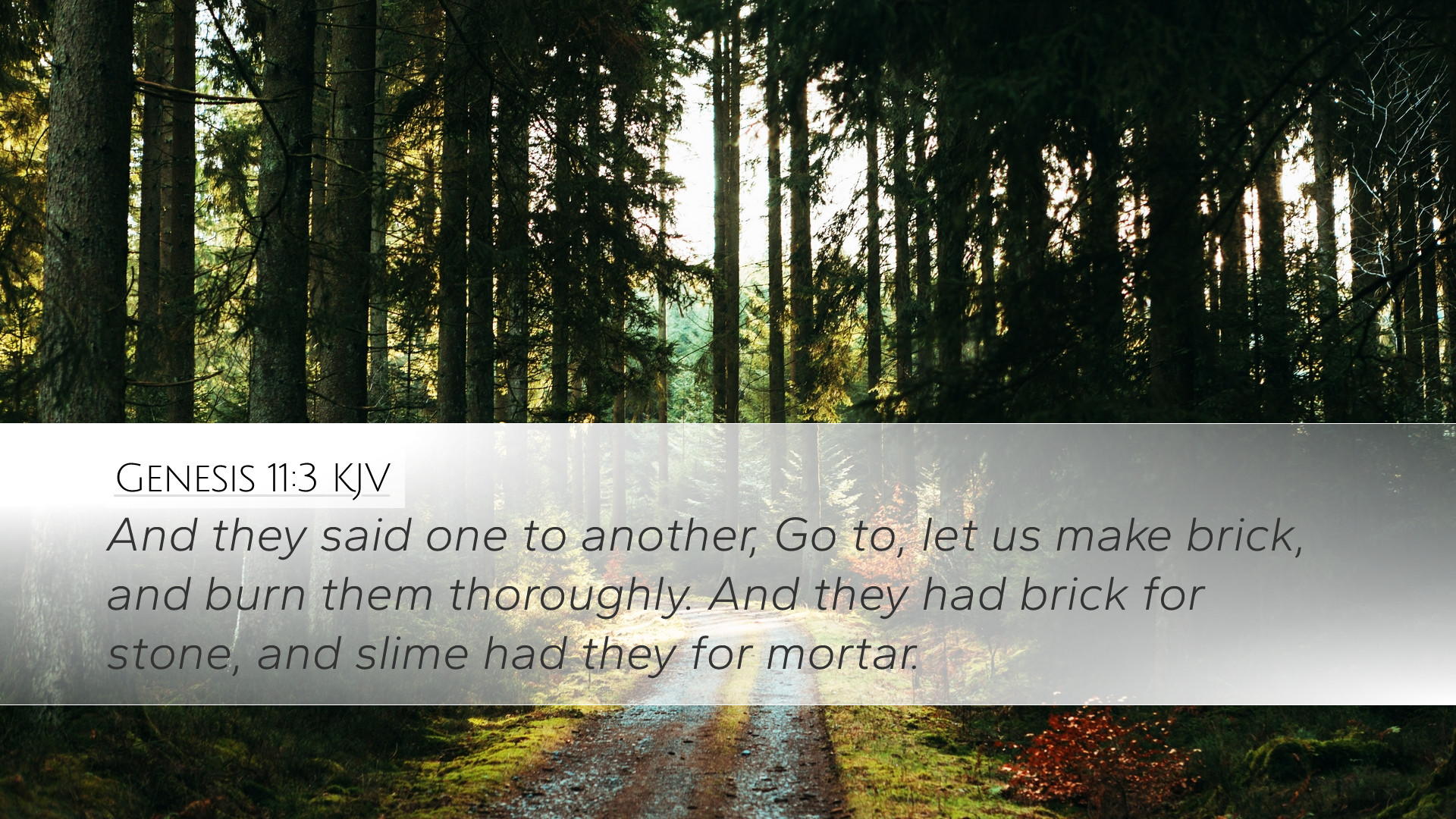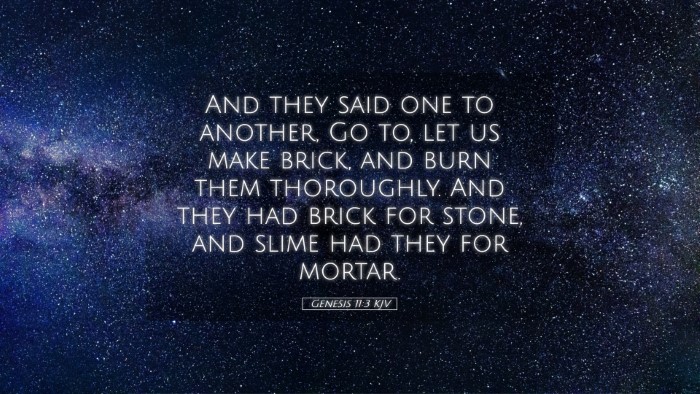Commentary on Genesis 11:3
Text of Genesis 11:3 (KJV): "And they said one to another, Go to, let us make brick, and burn them thoroughly. And they had brick for stone, and slime had they for morter."
Contextual Background
The passage from Genesis 11 occurs in the context of the post-Flood world, where humanity is united in language and purpose. The descendants of Noah, striving to make a name for themselves, gather to build a city and a tower that reaches to the heavens. This tower is commonly understood to represent human ambition and pride.
Insights from Matthew Henry
Matthew Henry provides a comprehensive examination of this passage, emphasizing the initiative and ingenuity of mankind in their construction project. He notes, “When men are united in their endeavors, they can achieve great things, even in their rebellion against divine will.”
- The Significance of Unity: Henry highlights the remarkable outcomes that can arise from unity. The people’s decision to build the tower reflects a collective purpose that embodies human cooperation.
- Use of Brick Over Stone: The choice of brick as a material instead of stone indicates a resourcefulness; however, it can also imply a departure from God’s creation, as stone was a divine provision, pointing towards self-sufficiency.
- Slime for Mortar: The mention of slime symbolizes temporal and unstable solutions. Henry cautions that human efforts, when isolated from God’s intentions, ultimately lead to fragility.
Perspectives from Albert Barnes
Albert Barnes underscores the theological implications inherent in this pursuit of building the tower. He states, “This act was not merely an architectural endeavor; it was an existential challenge to God’s authority.”
- Human Pride and Ambition: Barnes elucidates that the construction represents mankind's attempt to centralize their existence around human capabilities rather than divine guidance. Their ambition is framed as a means to avoid dispersion, which God had commanded.
- Symbolism of the Tower: The tower, intended to reach the heavens, symbolizes the desire for autonomy from divine oversight, showcasing a fundamental misunderstanding of humanity's place in God’s creation.
Adam Clarke’s Commentary
Adam Clarke offers additional reflections, exploring the implications of brick-making as opposed to stone-building. He suggests, “The construction of bricks signifies a human attempt to create something uniform, possibly as a metaphor for trying to systematize or control the divine aspects of life.”
- Technological Advancement: Clarke notes that the development of brick-making illustrates human innovation, yet it also signifies a moral decline, as humanity seeks constructs through their own wisdom rather than relying on God’s provision.
- The Role of Mortar: The term "slime" denotes a limited binding substance, poetically illustrating the weakness of human endeavors when disconnected from God's strength.
Theological Implications
This verse invites significant theological reflection, particularly concerning the relationship between human initiative and divine sovereignty. The construction effort stands as a metaphor for humanity's ongoing struggle with pride, self-sufficiency, and the desire for autonomy from God. It frames a larger narrative of rebellion that echoes throughout scripture.
Key Themes
- Unity versus Division: The desire for unified effort is polarizing when positioned against God’s plan for creation, which involves diversity and dispersal as a means of fulfilling his command to "be fruitful and multiply".
- Human Ingenuity: While commendable, it can become a double-edged sword, leading to circumstances where humanity seeks to usurp God’s glory.
- Divine Intervention: The ultimate response from God is a profound reminder that while humans may have aspirations, divine authority prevails, leading to the confounding of their language and the scattering of peoples.
Practical Applications
In a contemporary context, this narrative serves as a poignant reminder for pastors, scholars, and students engaged in ministry or theological studies:
- Assessing Unity in Ministry: Consider how unity among believers can be harnessed positively or negatively. Evaluation of motives behind church or ministry projects is crucial.
- Resourcefulness with God’s Provision: Reflect on how church initiatives can sometimes shift from reliance on God's resources to human ingenuity alone, potentially leading to efforts that lack divine endorsement.
- Emphasizing God’s Sovereignty: Acknowledge God's ultimate authority in achieving His purposes, promoting humility in the face of ambition.


